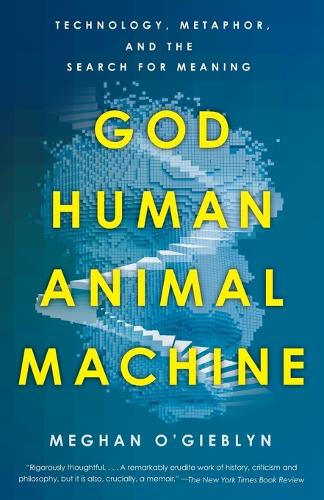
God, Human, Animal, Machine: Technology, Metaphor, and the Search for Meaning
(Paperback)
Publishing Details
God, Human, Animal, Machine: Technology, Metaphor, and the Search for Meaning
By (Author) Meghan O'Gieblyn
Random House USA Inc
Anchor Books
30th August 2022
1st July 2022
United States
Classifications
General
Non Fiction
814.6
Short-listed for Los Angeles Times Book Prize 2022
Physical Properties
Paperback
304
Width 132mm, Height 203mm
Description
A strikingly original exploration of what it might mean to be authentically human in the age of artificial intelligence, from the author of the critically-acclaimed Interior States. "Meghan O'Gieblyn is a brilliant and humble philosopher, and her book is an explosively thought-provoking, candidly personal ride I wished never to end ... This book is such an original synthesis of ideas and disclosures. It introduces what will soon be called the O'Gieblyn genre of essay writing." -Heidi Julavits, author of The Folded Clock For most of human history the world was a magical and enchanted place ruled by forces beyond our understanding. The rise of science and Descartes's division of mind from world made materialism our ruling paradigm, in the process asking whether our own consciousness-i.e., souls-might be illusions. Now the inexorable rise of technology, with artificial intelligences that surpass our comprehension and control, and the spread of digital metaphors for self-understanding, the core questions of existence-identity, knowledge, the very nature and purpose of life itself-urgently require rethinking. Meghan O'Gieblyn tackles this challenge with philosophical rigor, intellectual reach, essayistic verve, refreshing originality, and an ironic sense of contradiction. She draws deeply and sometimes humorously from her own personal experience as a formerly religious believer still haunted by questions of faith, and she serves as the best possible guide to navigating the territory we are all entering.
Reviews
Recipient of the Benjamin Hadley Danks Award from the American Academy of Arts and Letters
Finalist for the Los Angeles Times Book Prize in Science & Technology
Featured on the New York Times Book Reviews Paperback Row
OGieblyns loosely linked and rigorously thoughtful meditations on technology, humanity and religion mount a convincing and occasionally moving apologia for that ineliminable wrench in the system, the element that not only browses and buys but feels: the embattled, anachronistic and indispensable self. God, Human, Animal, Machine is a hybrid beast, a remarkably erudite work of history, criticism and philosophy, but it is also, crucially, a memoir. --The New York Times
Meghan OGieblyns essays are 'personal' in that they are portraits of the private thoughts, curiosities, and uncertainties that thrive in OGieblyns mind about selfhood, meaning, moral responsibility, and faith. There's nowhere her avid intellect won't go in its quest to find, if not 'meaning,' then the available modern tools we might use, today, as humans, to create it. OGieblyn is a brilliant and humble philosopher, and her book is an explosively thought-provoking, candidly personal ride I wished never to end. This book is such an original synthesis of ideas and disclosures. It introduces what will soon be called the OGieblyn genre of essay writing. --Heidi Julavits, author of The Folded Clock
"A fascinating exploration of our enchantment with technology." --Eula Biss, author of Having and Being Had
Having abandoned Christian fundamentalism, the author of this investigation of human-machine interactions embarks on a search for meaningShe finds that consciousness was not some substance in the brain but rather emerged from the complex relationships between the subject and the world. --The New Yorker
"A deeply researched work of history, criticism and philosophy, God Human Animal Machine...show[s] that religion isnt a subject matter you can simply move on from, nor does OGieblyn expect to outgrow her former vantage point as a believer. Instead, [the book] probes the uneasy coexistence between whats enchanted and whats disenchanted. --The Point
"One of the strongest essayists to emerge recently on the scene has written a strong and subtle rumination of what it means to be human. At times personal, at times philosophical, with a bracing mixture of openness and skepticism, it speaks thoughtfully and articulately to the most crucial issues awaiting our future." --PhillipLopate
Readers never lose sight of OGieblyn herself as a personality, even as she brings to bear subjects as diverse as quantum mechanics, Calvinism, and Dostoyevskys existentialism. Throughout the book, she is a brilliant interlocutor who presents complex theories, disciplines, arguments, and ideas with seeming ease. . .[this book] is nothing less than an account of not just how the mind interacts with the world, but how we can begin to ask that question in the first place. --Los Angeles Review of Books
[OGieblyn] is a whip-smart stylist whos up to the task of writing about this material journalistically and personally; her considerations encompass string theory, Calvinism, 'transhuman' futurists like Ray Kurzweil, and The Brothers KaramazovA melancholy, well-researched tour of faith and tech and the dissatisfactions of both.--Kirkus Reviews
OGieblyn has a knack for keeping dense philosophical ideas accessible, and theres plenty to ponder in her answers to enduring questions about how humans make meaning...Razor-sharp, this timely investigation piques. --Publisher's Weekly
Illuminating...[A] very personal account of a painful philosophical evolution. A compelling reminder that the deepest philosophical queries guide and shape life. --Booklist
An essential warning about the persistent seductions and dangers of technological enchantment in our supposedly disenchanted age. --Tufts University's 2021 Winter Book Recommendations
"Brilliant." --Melissa Febos, author of Body Work
Author Bio
MEGHAN O'GIEBLYN is the author of the essay collectionInterior States, which was published to wide acclaim and won the Believer Book Award for Nonfiction. Her writing has received three Pushcart Prizes and appeared inTheBest American Essaysanthology. She writes essays and features forHarper's Magazine,The New Yorker, The Guardian, Wired,The New York Times, and elsewhere. She lives with her husband in Madison, Wisconsin.
